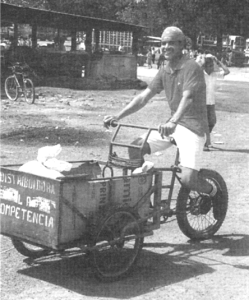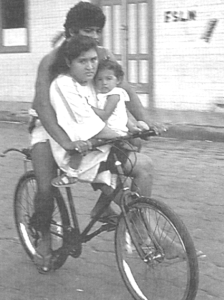by John Griffin
Spring/Summer 1996 InGear

1996 in Rivas, Nicaragua, signaled the fifth consecutive year that Pedals for Progress has been supplying bicycles and spare parts to the Asociación de Desarollo Comunitario, a small Nicaraguan cooperative. The impact of the project is tangible: Rivas has been transformed into a vibrant and bustling center of activity, made so in part because of the ubiquitous presence of bicycles. Whereas walking was once the leading mode of travel in Rivas, as it is in most Latin American towns and villages, the infusion of bicycles initiated by Pedals for Progress’s efforts has made cycling the number one mode of travel in Rivas.
By most estimates, between 60% and 80% of all Rivas households own at least one bicycle and demand for affordable bikes continues to be high. Containers of up to 425 bicycles from Pedals for Progress are usually distributed by the Rivas ADC within two weeks of arrival. Demand is high because for many individuals, the bicycle is either a direct or indirect means of employment. At the least, the bicycle saves hours of tedious transport time for families, as well as money that would otherwise be spent on bus or taxi fare.

It is not uncommon in Rivas to see families of three on a bicycle, often transporting a child to school, an adult to a work place, while another adult uses the bicycle to do errands around town. A recent study by a City University of New York urban planning graduate student of the socio-economic impact of the bicycle in Rivas found that over one quarter of survey respondents reported using the bicycle regularly to earn income. For some this means that the bicycle is used to move goods for sale, while for others it means that the bicycle enables getting to a job which would otherwise be impossible or uneconomical to reach. When incomes were compared between this group and those who don’t use bikes to generate income, a 14% difference was noted, favoring those who use bicycles in their work.
It is common in Rivas for women to use the bicycle in numbers nearly equal to those of men, enabling far greater independence for woman than in many other places where women’s mobility is limited. This fact was borne out by results from the study, which showed greater parity of income between men and women who use bicycles in their work. These numbers are especially significant since income equality between the sexes is one of the most elusive goals for economic development experts.
Rivas is now a noticeably different town than it was prior to the introduction of the bicycle. Along with the backdrop of volcanoes and lush tropical growth, bicycles are now a permanent part of the Rivas landscape. Moreover, commercial activities appears to have increased in Rivas, perhaps due in part to the greater mobility of the inhabitants. One thing is certain: 1800 donated bicycles have found useful second lives as primary transport and means of employment for an equal number of people in Rivas.
*Proceeds from the sale of the cycles are used by the ADC to support projects in and around Rivas, including a tree nursery, an innovative roofing tile factory, construction of an elementary school, irrigation systems and an infant nutrition program and laying of potable-water lines.
